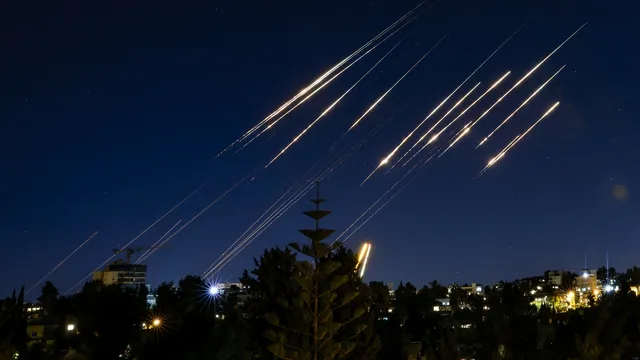
IDF secures air superiority over Tehran amid rising tensions
2025-06-16 14:40- The IDF has conducted over 170 strikes against Iranian military targets in three days.
- Iran aims to expand its missile arsenal to 8,000, positioning a significant threat to Israel.
- Israel has established air superiority over Tehran, reshaping regional security dynamics.
Express your sentiment!
Insights
In June 2025, Iran intensified its missile strikes aimed at Israeli population centers as the Israel Defense Forces (IDF) launched a significant military campaign against Iranian missile and nuclear facilities. The IDF reported conducting over 170 strikes against Iranian military targets in three days, making substantial headway in neutralizing threats posed by Iran's ballistic missiles. Despite Iran's initial capability of launching 2,000 ballistic missiles, Israel's operations targeted launching vehicles, crucial for executing their missile strategies. The IDF's campaign followed extensive intelligence gathering efforts that lasted for years, illustrating a well-prepared operation supported by the Mossad. Israeli officials revealed that the Iranian regime aims to amass a significant arsenal of 8,000 ballistic missiles which would be aimed at overwhelming Israel. Unlike Iran's tactics that deliberately target civilians, the IDF issued warnings to Iranian civilians ahead of strikes on military assets. As part of this ongoing military operation, dubbed Operation Rising Lion, Israel aimed to reshape regional security dynamics by preventing the Iranian regime from realizing its military ambitions. Israel Katz, Israel's defense minister, warned that civilians in Tehran would bear the consequences of the Iranian regime's provocative actions, threatening timely retaliation for missile attacks. The situation remains dynamic, with the potential for escalated conflict. The IDF has reassured Israelis of their commitment to maintaining security and anticipates further operations against any remnants of Iran's military capabilities. Officials have indicated a longer-term framework for these operations, hinting at strategic objectives that extend into the foreseeable future.
Contexts
The current tensions between Israel and Iran reflect a complex interplay of historical grievances, ideological differences, and geopolitical rivalries that have intensified in recent years. Israel views Iran as its primary regional adversary, particularly due to Iran's support for militant groups such as Hezbollah in Lebanon and Hamas in Gaza, as well as its contentious nuclear program. Iran, in turn, perceives Israel as a significant threat to its influence in the Middle East and as an opponent of its ideological and political ambitions. This ongoing conflict is underscored by a series of proxy wars, cyber warfare, and direct confrontations that have recently escalated, creating a precarious atmosphere in the region. Following the U.S. withdrawal from the Joint Comprehensive Plan of Action (JCPOA) in 2018 and the subsequent reimposition of sanctions on Iran, tensions have risen sharply. Iran has expanded its nuclear activities, which Israel considers a direct existential threat. In response, Israel has often stated its willingness to take military action to prevent Iran from obtaining nuclear weapons. This proactive stance has included airstrikes against Iranian positions in Syria, aimed at disrupting arms transfers to Hezbollah and other militant groups poised against Israel. The resultant military and intelligence operations underscore Israel's commitment to maintaining its national security and deterrence strategy, even amid rising regional tensions. The geopolitical implications of this adversarial relationship extend beyond bilateral conflicts, involving key global players such as the United States, Russia, and various European nations. The U.S. has historically been an ally of Israel, providing substantial military and economic support. In contrast, Iran has cultivated partnerships with nations like Russia and has sought to position itself as a counterweight to U.S. influence in the region. The dynamics of this power struggle lead to an ever-changing landscape where diplomatic negotiations, military developments, and economic pressures play critical roles. Furthermore, recent normalization agreements between Israel and several Arab states, known as the Abraham Accords, have further isolated Iran, prompting it to respond with heightened rhetoric and more aggressive postures. As of June 2025, the threat of armed conflict remains palpable, with both nations engaging in activities that could spark a broader confrontation. The potential for miscalculation or escalation due to misunderstandings is significant, making diplomatic efforts to reduce tensions essential. International stakeholders continue to call for dialogue to address these underlying issues and to find a peaceful resolution to the threats posed by Iran's nuclear ambitions and its regional activities. The future trajectory of Israel-Iran relations is uncertain, heavily influenced by domestic politics, international diplomacy, and the strategic calculations of both nations. The implications of this rivalry resonate throughout the region, underscoring the need for sustained engagement and a comprehensive strategy to foster stability in the Middle East.